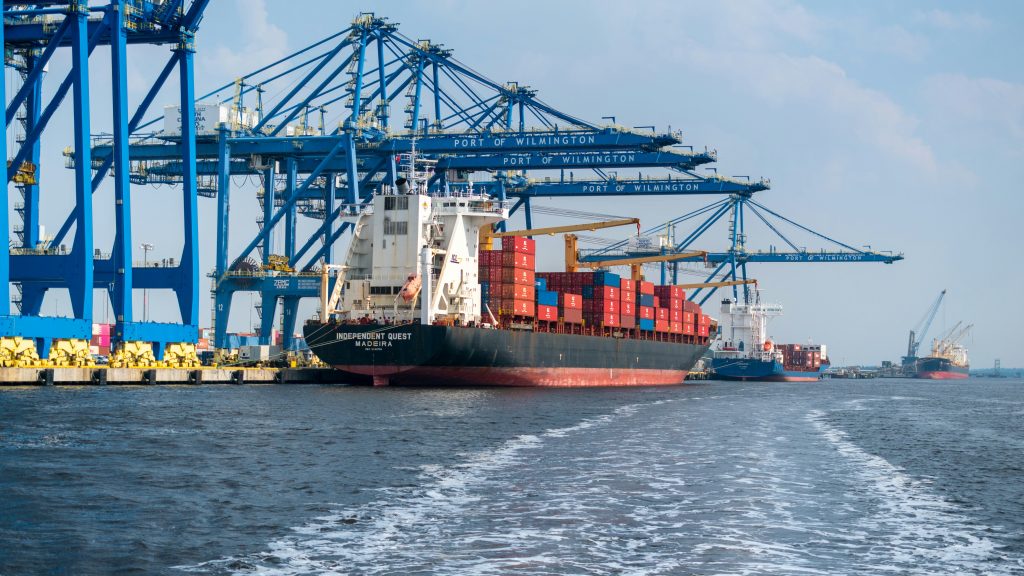
The Trump administration has announced new fees on Chinese-built vessels following a United States Trade Representative (USTR) investigation, which determined that China’s policies and practices in the maritime and shipbuilding industries were unreasonable and harmful to U.S. commerce.
“Ships and shipping are vital to American economic security and the free flow of commerce,” said U.S. Trade Representative Jamieson Greer. “The Trump administration’s actions will begin to reverse Chinese dominance, address threats to the U.S. supply chain, and send a demand signal for U.S.-built ships.”
The investigation, initiated under the Biden administration and finalized in January, revealed that China’s shipbuilding industry had gained an unfair advantage, severely disadvantaging U.S. companies, workers, and the economy. In response, the USTR’s policy imposes service fees on Chinese-owned vessels and operators using Chinese-built ships at U.S. ports.
Fee Schedule
Chinese Vessel Operators and Owners
| Effective Date | Fee Amount |
| 17-Apr-25 | $0 per net ton for arriving vessels. |
| 14-Oct-25 | $50 per net ton for arriving vessels. |
| 17-Apr-26 | $80 per net ton for arriving vessels. |
| 17-Apr-27 | $110 per net ton for arriving vessels. |
| 17-Apr-28 | $140 per net ton for arriving vessels. |
Operators of Chinese-Built Vessels
| Effective Date | Fee Amount |
| 17-Apr-25 | $0 per container discharged. |
| 14-Oct-25 | 18pernetton(18pernetton(120 per container). |
| 17-Apr-26 | 23pernetton(23pernetton(153 per container). |
| 17-Apr-27 | 28pernetton(28pernetton(195 per container). |
| 17-Apr-28 | 33pernetton(33pernetton(250 per container). |
Foreign-Built Car Carrier Vessels October 2025 $150 per Car Equivalent Unit (CEU).
LNG Vessel Restrictions
The second phase of the policy, beginning in three years, will target LNG vessels. Restrictions on transporting liquefied natural gas (LNG) via foreign-built ships will increase incrementally over 22 years.
Incentives for U.S.-Built Ships
Vessel owners can receive fee remissions if they provide proof of ordering U.S.-built ships. The remission will be based on the net tonnage capacity of the U.S.-built vessel ordered. If the vessel owner fails to take delivery of the U.S.-built vessel within three years, the fees for the non-U.S.-built vessel will become immediately due.
Exemptions
Certain types of shipping are exempt from the fees, including:
- Great Lakes and Caribbean shipping.
- Shipping to and from U.S. territories.
- Bulk exports such as coal or grain.
- Empty ships arriving at U.S. ports.
The USTR made changes to the original proposal after receiving feedback during public hearings in March, where over 300 trade groups and stakeholders testified. The original plan called for fees of up to $1 million per Chinese-owned operator and $1.5 million per port of call for non-Chinese-owned carriers using Chinese-built vessels. Many warned that the U.S. was not prepared for an economic conflict that placed ocean carriers using Chinese-built ships at the center, especially as Chinese-made vessels are projected to represent 98% of global trade ships within the next few years.
Definition of relevant terms
Chinese Shipbuilders
Chinese shipbuilders are companies or entities based in China that design, construct, and manufacture ships and vessels for various purposes, including commercial shipping, military use, and specialized industries such as oil and gas transportation. These shipbuilders are often supported by government subsidies and policies, enabling them to dominate the global shipbuilding market. Major Chinese shipbuilders include companies like China State Shipbuilding Corporation (CSSC) and China Shipbuilding Industry Corporation (CSIC).
Shipowners
Shipowners are individuals, companies, or entities that own ships or vessels used for commercial, industrial, or private purposes. Shipowners are responsible for managing and operating their ships, including maintenance, crew employment, and compliance with international maritime laws. Shipowners may lease their vessels to transportation operators or directly engage in shipping activities. In the global context, Chinese shipowners often operate fleets of vessels built by Chinese shipbuilders.
Shipbuilding Sectors
The shipbuilding sector refers to the industry involved in the design, construction, and maintenance of ships and marine vessels. This sector encompasses shipyards, engineering firms, material suppliers, and labor forces that contribute to building various types of vessels, such as cargo ships, tankers, cruise ships, and naval vessels. The shipbuilding sector is critical to global trade and national defense, with China being one of the leading players in this industry due to its advanced infrastructure and government-backed initiatives.
Transportation Operators
Transportation operators are companies or entities that manage and operate vessels for the movement of goods, passengers, or resources across waterways. These operators may lease or own ships and are responsible for logistics, scheduling, and ensuring efficient delivery of cargo or services. Transportation operators are key players in the global supply chain, facilitating international trade and commerce. In the context of Chinese-built ships, transportation operators often utilize these vessels for cargo shipping worldwide.








